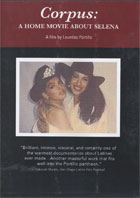
Corpus: A Home Movie About Selena 1999
Distributed by Women Make Movies, 462 Broadway, New York, NY 10013; 212-925-0606
Produced by Xochitl Productions
Directed by Lourdes Portillo
DVD, color, 47 min.
Sr. High - Adult
Popular Culture, Women's Studies, Latin American Studies, Latino Studies, Music
Date Entered: 01/15/2007
Reviewed by Lourdes Vázquez, Rutgers University LibrariesThis documentary is a perceptive exploration of the legendary Texas singer Selena Quintanilla within the different sectors of the Chicano community. Selena, a Chicana from Corpus Christi—a Tejana—traveled with her family and performed from city to city playing not only music in English but in Spanish. Selena's unique voice, body and charisma mesmerized the thousands who came to her concerts, and bought her music and clothing designs. In 1987, she was named Female Vocalist of the Year and Performer of the Year at the Tejano Music Awards. Her many accomplishments included the first Gold album in the history of Tejano Music and a Grammy in 1993 for Best Mexican American Performance.
After Selena's tragic death in 1995 at the hands of the President of her Fan Club so much was written by the entertainment media that Portillo decided to investigate "…who was Selena affecting." Through interviews with members of the community, Portillo explores the impact of Selena's death as well as her legacy. For several weeks she interviewed fans, especially those who left messages at Selena’s gravesite or at her statue on the seawall at Corpus Christi. Portillo also interviews a group of intellectual Chicanas, such as Cherie Móraga and Sandra Cisneros. It is interesting to comment that from a long conversation over dinner with these intellectuals came the documentary Conversation with Intellectuals about Selena (1999), produced and directed by Portillo. She also interviewed Selena's father and sister, and the very-well known radio host Vicente Carranza. Selena’s body and voice move through portions of the film, excerpted from the Quintanilla family archives. Portillo creates an interesting and loving portrait of Selena's significance in popular culture across borders and her impact on young Chicana girls.
The film was shot in Corpus Christi, where twelve years after her death, multiple fans still visit her gravestone, her home, as well as her statue in town. In Latin Corpus Christi means the body of Christ, el cuerpo de Cristo, a traditional link to the Catholic Hispanic ancestors. Corpus in this film is also defined as another body—a Latina body—with her dark hair, dark eyes, fuller hips, distinct rear end, unique voice and charisma.
This documentary is recommended as an educational tool for discussion and study within Latino studies, women's studies, Latin American studies and popular culture courses, and for public and academic library collections.
Awards
- Golden Spire Award, San Francisco International Film Festival